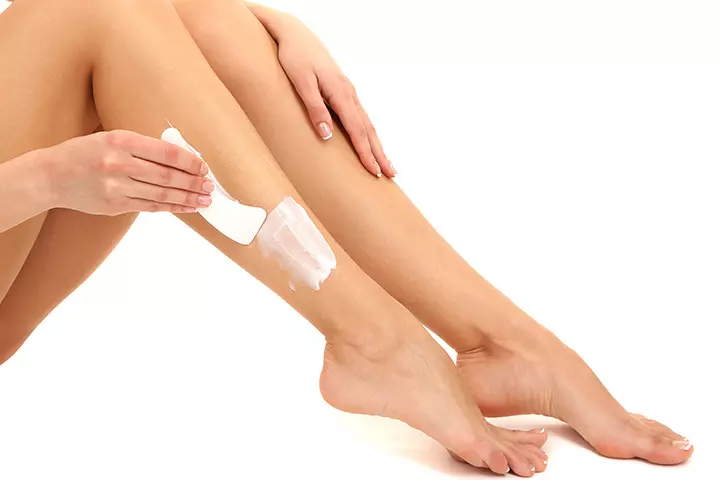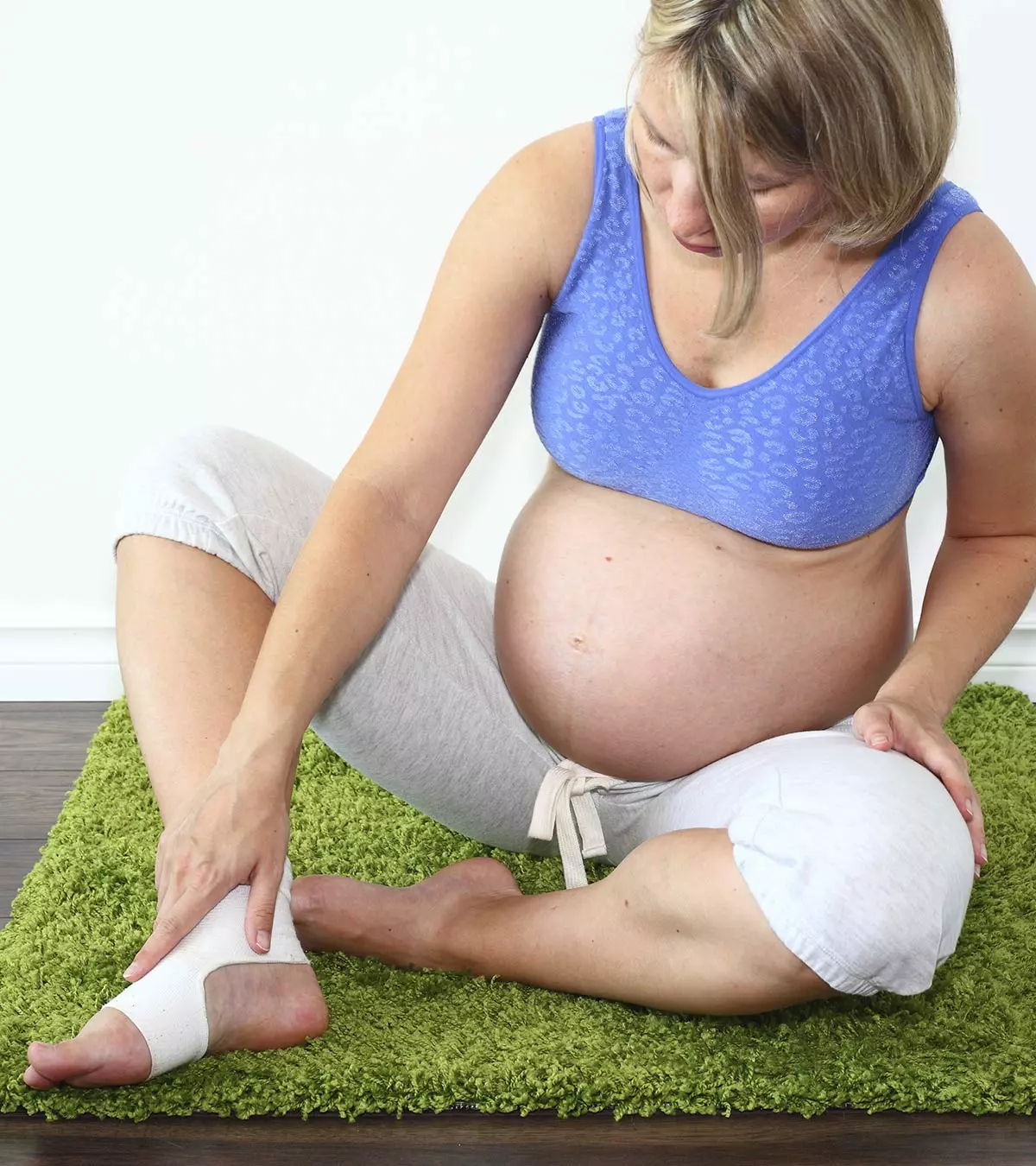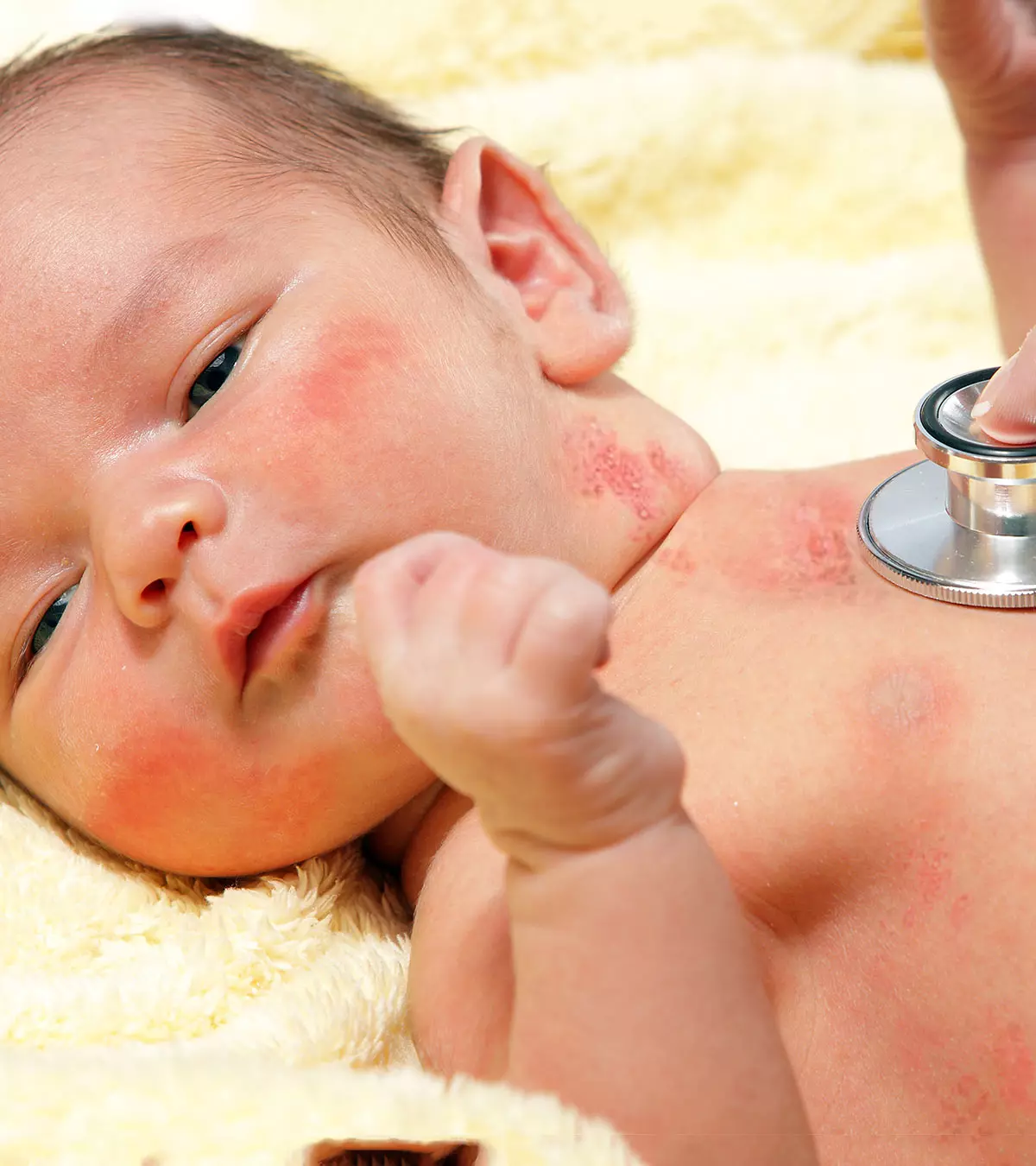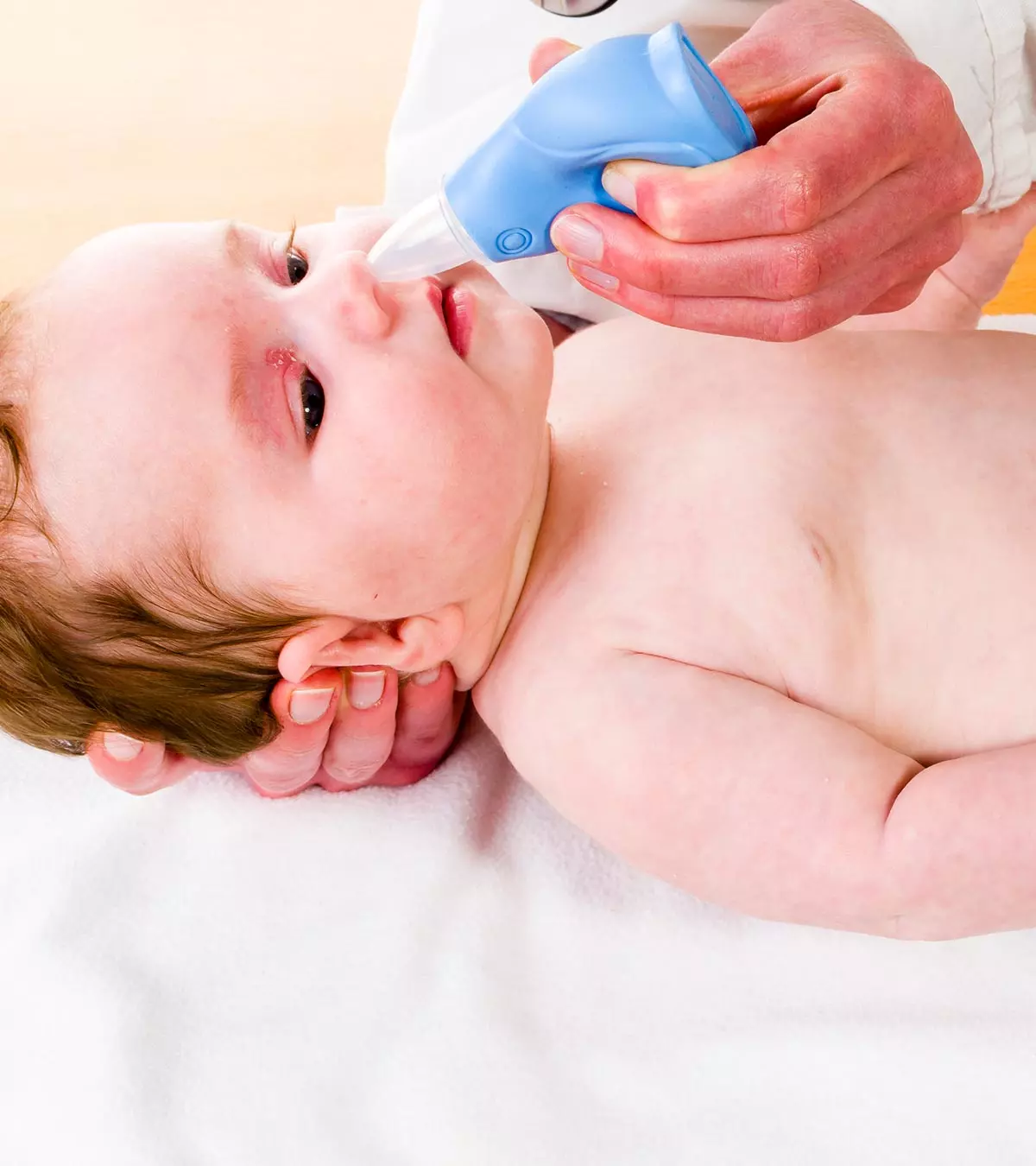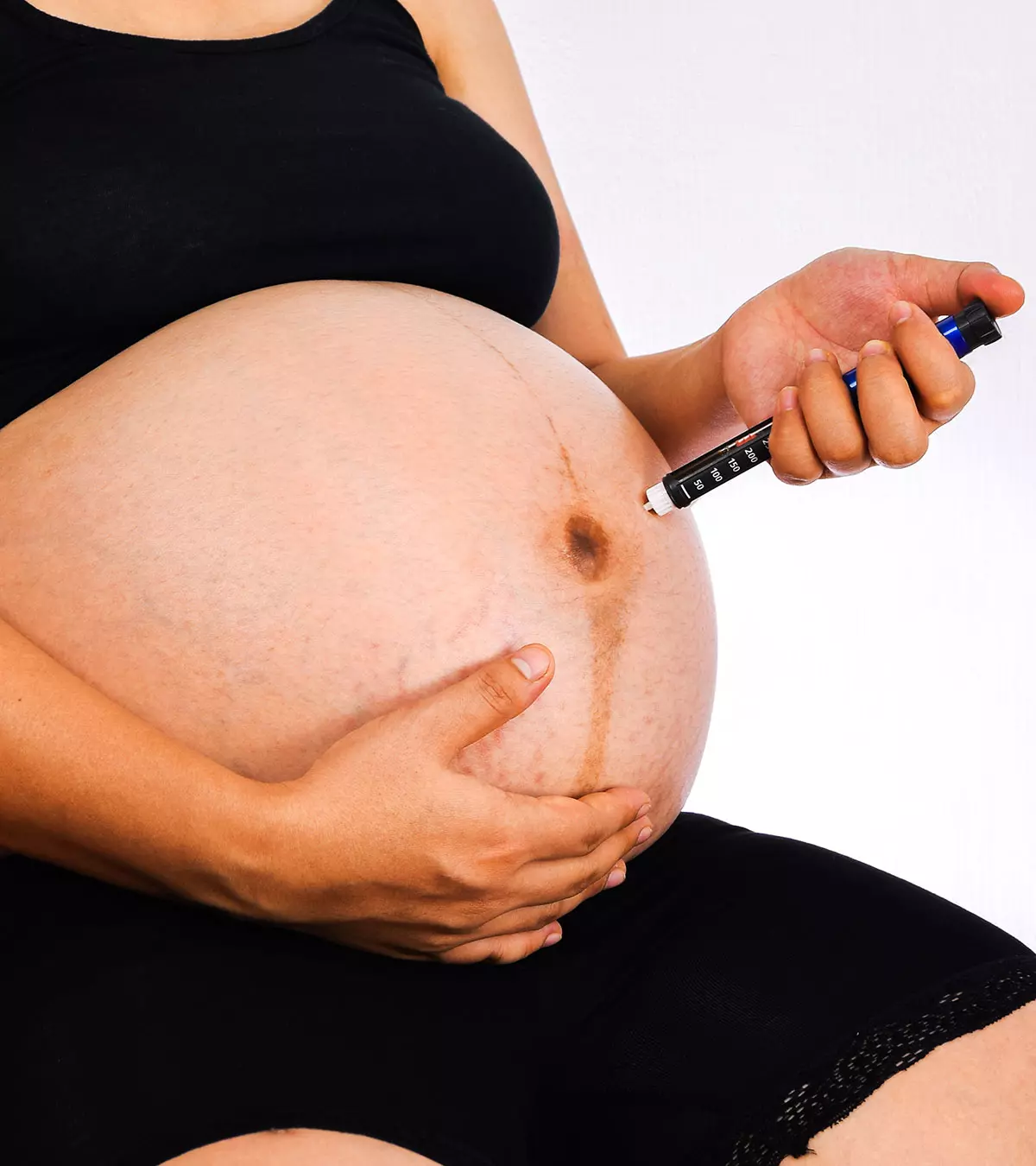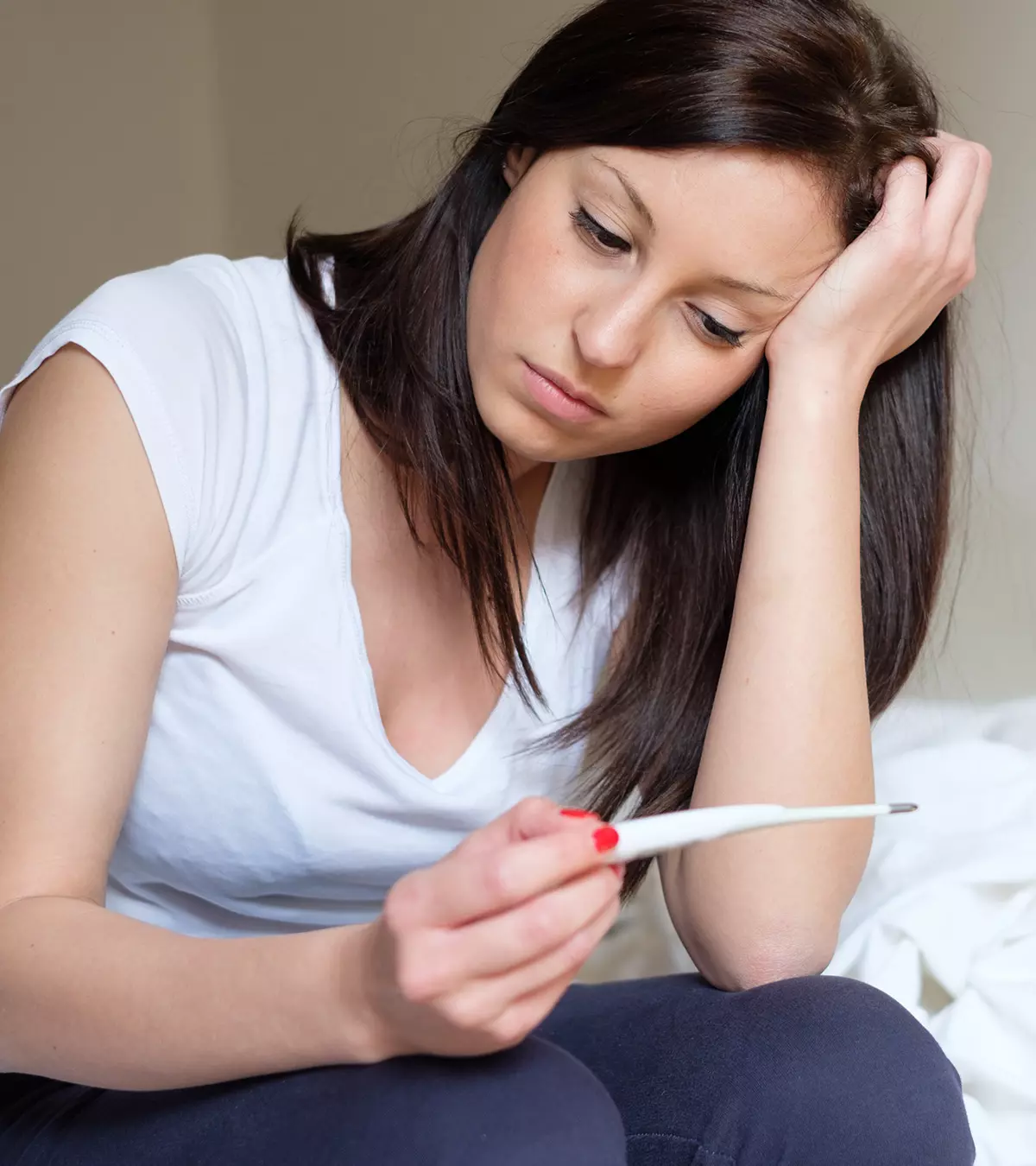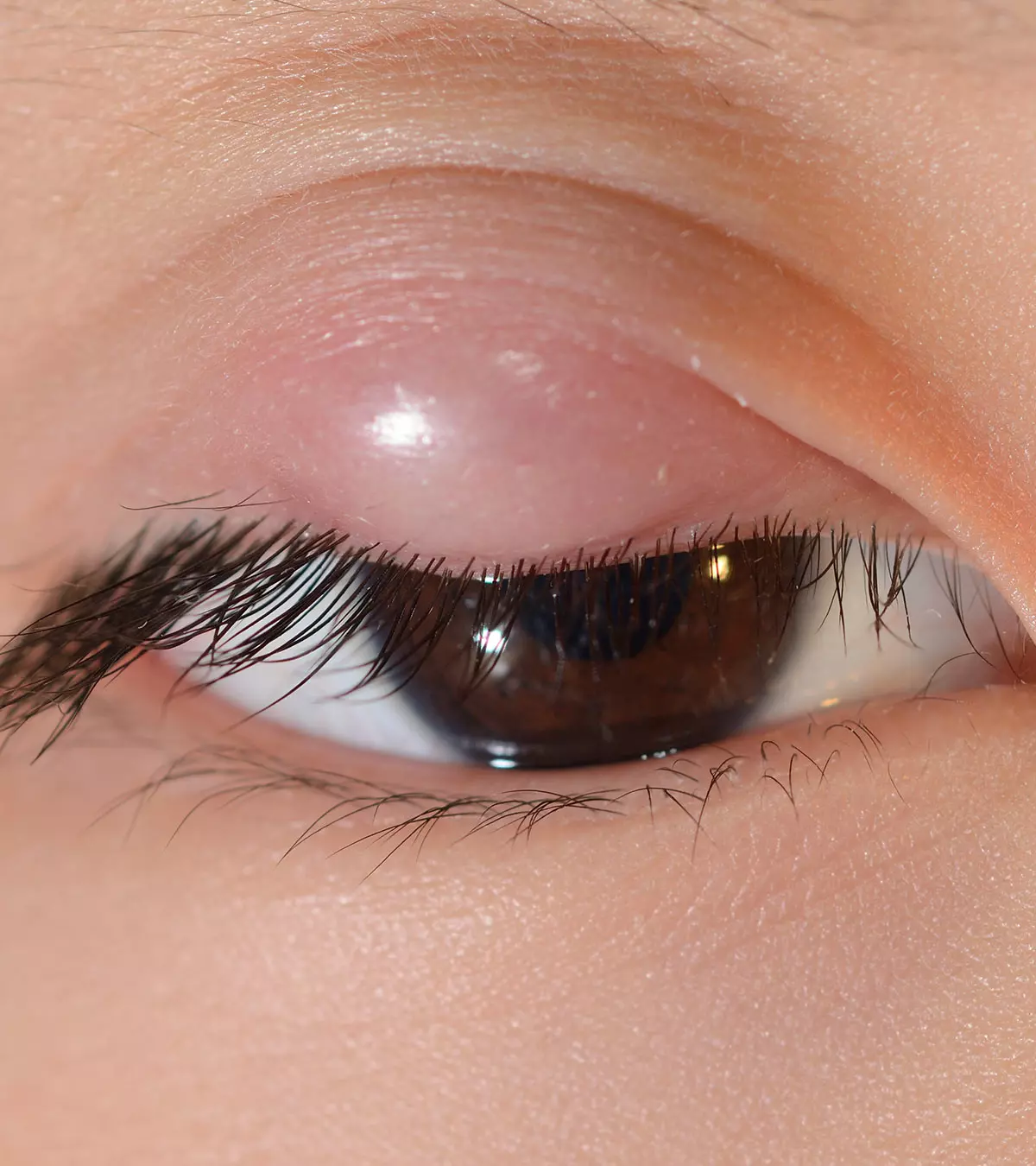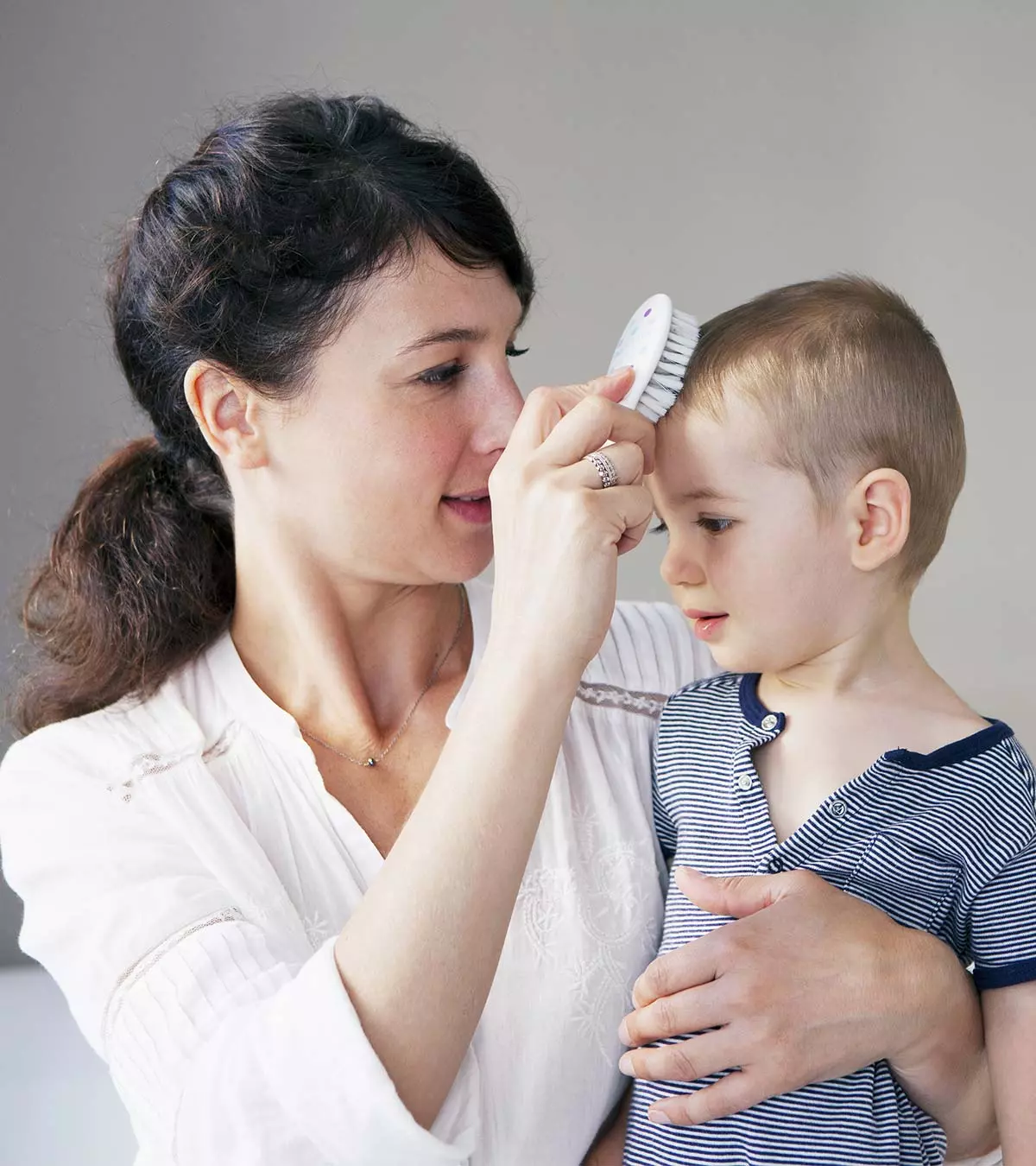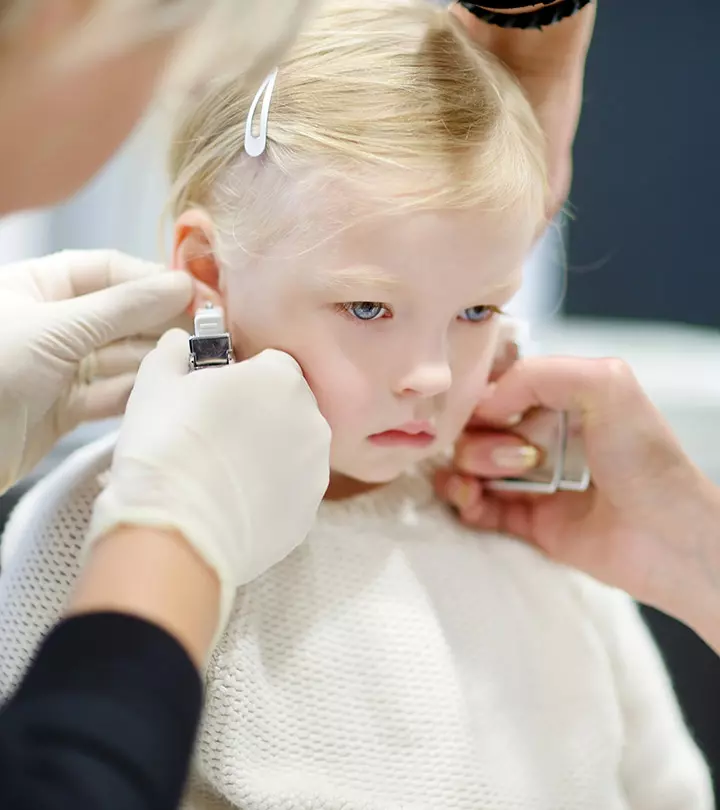
Image: ShutterStock
The time of ear piercing for kids may vary in each culture. Some may do it too early, while others do it later or not pierce at all. If ear piercing does not have a cultural significance, parents can choose to get their child’s ears pierced any time they want to. While some parents are excited to see their little one wearing pretty earrings, some are also worried about piercing. Thus, ear piercing comes with questions and concerns. Parents want to ensure that the process is safe, the timing is right, and that they are well informed about the potential risks involved. If you wish to know about the pros and cons of ear piercing for kids and precautions to avoid infections, reading our post could help.
Key Pointers
- It is best to get a piercing for your child after they are 6 months or older.
- Numbing creams or ice can help in reducing the pain during the piercing process.
- It is important to make your child aware of the slight pain they may feel in a calm manner.
- Ear piercings should only be done by a professional with sterile equipment.
- Follow aftercare instructions and be aware of the signs of infection.
Right Age To Get Your Kid’s Ears Pierced
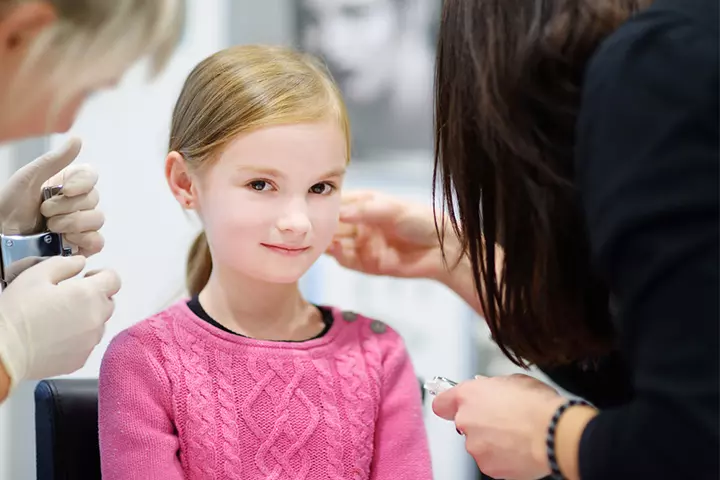
When you get your kid to the ear piercing chair is a topic that is best left for you to decide. Getting your kid’s ears pierced is a very personal subject, and there is not a particular criteria that you have to follow regarding the ‘right’ age. When you do want to decide on the right age for your kid, do keep the following pointers in mind before kids getting their ears pierced:
- Some experts suggest that it can be harmful if you pierce your child’s ears at a very early age. The reason they offer is that when you puncture your kid’s skin, it will be more susceptible to infection. As an infant, your child’s immunity levels are still developing, and it means that your child (at infancy) will not be able to fight off the infections that may creep in, which may slow down healing. Experts feel that it is always best to wait until your child is at least six months of age and then get the ears pierced. According to the American Academy of Pediatrics (AAP), it is ideal to wait until the child can responsibly care for the piercing site before proceeding with ear piercing (1).
- If you want your child to have some say in whether or not you should get their ears pierced, you can also wait till they are about nine or ten years old. By that age, your kid will be more aware of what they want and will understand the process better. Also, the plus point to it is that if your child is at an age where they understand better, they will be more responsible and take better care of their piercing as well as the jewelry.
Liang May, a mother of two children from Singapore shares how her three-year-old daughter requested to have her ears pierced. I asked her, “Do you really want to get earrings Faye?
‘Yes,’ She said. I narrowed down on a doctor’s clinic to get the piercing done. Faye (my daughter) sat quietly and confidently on me as Dr Oh pierced her first earring into her left ear. No cries, no jostles, no surprise even after five seconds of piercing. She just sat there, watched her video, and probably felt no pain at all. Then! When Dr Oh wanted to pierce her right earlobe, she retaliated.
We did it in the end and my daughter didn’t go home with just one side of her ears pierced. We were advised to return one week later for a free review. In the meantime, there was no need to clean the area with alcohol or any sort of cream. All we needed to take note of was, no swimming within the week and to keep the earrings on for three full months (i).”
Ensuring That Your Kid Feels Minimal Pain While Getting Their Ears Pierced
One of the biggest fears that most parents have when they take their kids to get their ears pierced is the pain that will come as part of the piercing. If you have decided to take your kid for a session of ear piercing but want to make sure that they experience as less pain as possible, keep the following points in mind:
- Ask your doctor to prescribe a numbing cream that will help to reduce the pain. Numbing creams that contain lidocaine derivatives will help to act as a local anesthesia so that your kid will not feel the pain at the time of piercing the ear.
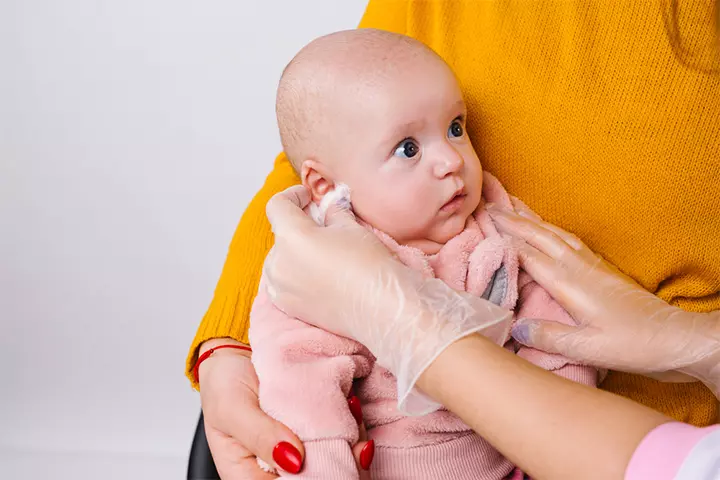
- You can apply a thick layer of the cream on your kid’s ear lobes at least 30 to 60 minutes before the ear will be pierced.
 Point to consider
Point to consider- Alternatively, if you do not want to use a medicated cream to numb the area, you can also apply a cube of ice on the ear lobes just before the ears are pierced to prevent earache in kids.
- The cold from the ice cubes will numb the pain receptors that are present in the area for those next few minutes. As a result, your kid will not feel the pain during the time the ears will be pierced.
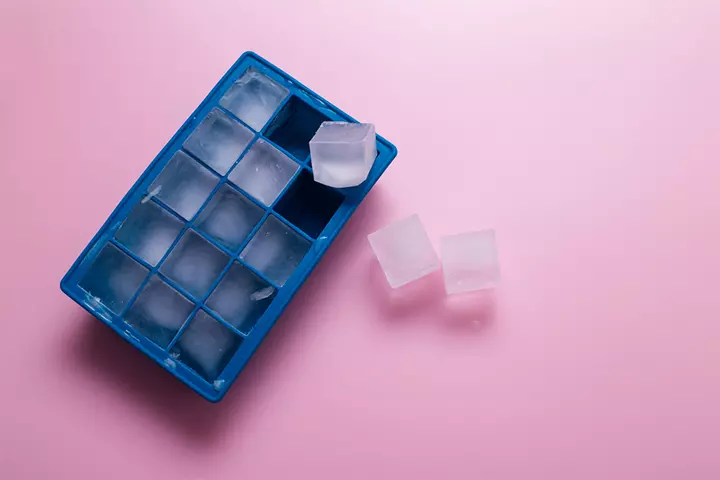
- Do remember that even when you use the above methods, it will not remove the pain completely, and your kid will feel a little pain and discomfort nonetheless. It might be beneficial to discuss the procedure with your child in simple terms beforehand, so they know what to expect. This can help alleviate anxiety and prepare them mentally for the experience. Instead of letting them feel it suddenly, tell them that it will feel as little as they get hurt when they get an injection. If your kid is too young to understand, you can tell them it will be a small ouch in the ear for one tiny moment and then it will all be gone.
- Talk to your kid in a practical way and be sure that you are not anxious or worried in front of her. If you look scared yourself, your kid will pick up the signals from you and will also get scared and anxious. You can also ask them to take deep breaths while the ear is being pierced, as it will help them stay calm.
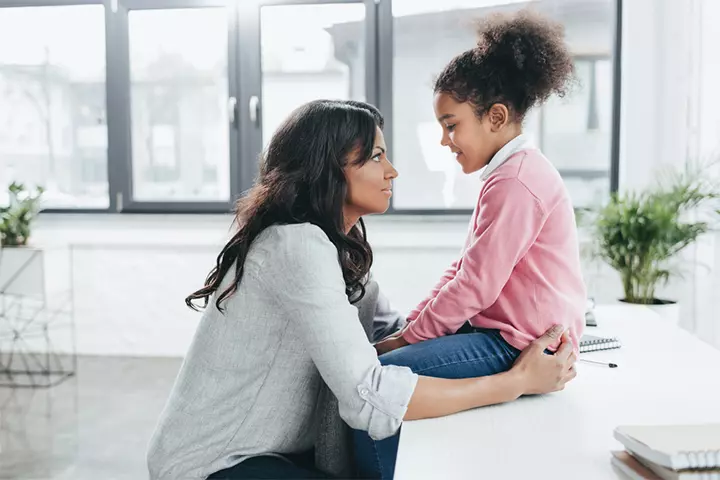
Reacting to his daughter’s ear-piercing, Justin, a vlogger, opens up about the proud and emotional moment, “My little girl is no longer a little girl—she now has her ears pierced like a big girl!
“I didn’t know what to expect from this whole ear-piercing adventure. Honestly, I was sure she would cry or flinch. But when they pierced her ears, she didn’t even blink! She sat there so stoic, and the lady who pierced her ears said, ‘You’re the toughest four-year-old I’ve ever met’ (ii).”
 Quick fact
Quick factWho Should Pierce Your Kid’s Ears?
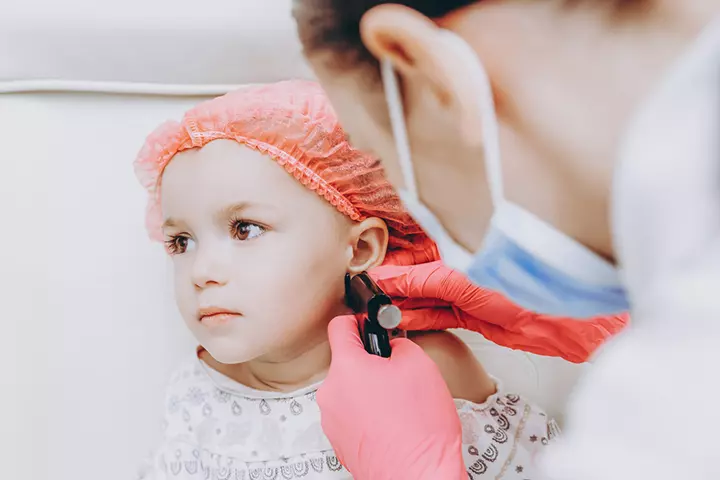
Before you decide a place and person to get your kid’s ears pierced, here are a few things you should consider:
- You can first ask your kid’s pediatrician or dermatologist if they do pierce kids’ ears. If they do, you will be sure that the doctor will use equipment that is sterile and will have the least chance of causing an infection. Also, your kid’s doctor will usually follow the safest practices when it comes to hygiene. Most dermatologists and pediatricians, however, do not pierce a kid’s ears, but you can still ask, just to be sure.
- In case, your pediatrician or dermatologist says no, you can ask them for a reference where you can get ear piercings for kids safely.
- Once you visit the person, who will pierce your kid’s ears, ask them how many years of experience they have in this field. The concerned person should ideally have more than a year of experience in child ear piercing specifically.
- You also have to be very sure to see that the person who will pierce your kid’s ears follows the basic safety standards such as sterilizationiA process of eliminating microbes from an object or surface . Make sure the person washes hands before touching the equipment or puts on gloves. Also, you can ask them to clear the ear lobes with a wad of cotton wet with alcohol, to reduce chances of any infection (2).
Are Piercing Guns Safe?
Using piercing guns is not considered safe. The Association of Professional Piercers (APP) emphasizes the importance of using only sterile disposable equipment and materials proven to be safe for body piercing. Reusable ear-piercing guns carry notable risks as they can easily become contaminated with bloodborne pathogensiMicrobes that are capable of causing diseases, including bacteria, viruses, worms, protozoa, and fungi and are often not adequately sanitized. The use of contaminated guns increases the risk of transmitting severe infections like hepatitisiInflammatory condition of the liver caused by viral infections or other factors or staphiInfection caused by staphylococcus bacteria presenting with skin redness, swelling, pain, and sometimes pus , particularly in individuals with underdeveloped or compromised immune systemiA complex network of cells, tissues, and organs that help the body fight infections and protect itself from outside invaders s. Additionally, piercing guns can cause significant tissue damage, resembling crush injuries, and may result in complications such as auricular chondritisiInflammation of the ear's cartilage, causing pain, swelling, and redness , scarring, and problems with the cartilageiA flexible connective tissue within the body that protects the bones and joints by acting as a shock absorber (3). Research suggests that a piercing gun may cause more damage to the ear cartilage. Therefore, experts may prefer using a piercing needle instead (4).
Caring For Your Child After Ear Piercing
Ear piercing is a simple procedure, but taking proper care afterward is essential to ensure healing and avoid infections. Here are some home care tips to help promote a smooth recovery (5) (6):
- Keep the piercing site clean: Gently clean the area once or twice a day with mild soap and water or saline solution. Always wash your hands thoroughly before cleaning.
- Avoid touching the site: Only touch the area when cleaning it with clean hands. Avoid touching it otherwise, as this can transfer bacteria.
- Be mindful of the earrings: Avoid changing earrings for at least two months. If your technician recommends rotating the earrings daily, follow their advice. Do not twist or turn them roughly, as this can irritate the piercing site.
- Limit harsh chemicals: Avoid using antiseptics or chemical products on the ears unless a doctor advises. Also, keep the lotions and hair products away from the piercing site.
- Allow the site to heal: Be cautious not to accidentally touch or disturb the site while shampooing or brushing your child’s hair, as this can cause irritation or tear the piercing.
- Avoid swimming and tub baths: Instruct your child to avoid swimming or bathing in oceans, pools, or tubs until the piercing is completely healed to prevent infection.
- Monitor for signs of infection: Check for signs such as redness, swelling, or pus at the piercing site. If these symptoms persist for over a day, contact your child’s doctor.
Frequently Asked Questions
1. How long do ears hurt after piercing?
It is natural to experience pain, swelling, and redness for about two days after an ear piercing. If these symptoms don’t go away even after a week, you should consult a doctor to check for infection (5).
2. Does an ear bleed on piercing it?
Although not very common, piercing can sometimes lead to the oozing of blood or white, yellow, or greenish pus (7).
3. How long after piercing ears can my child swim?
The NHS recommends avoiding swimming for at least 24 hours after getting a piercing or until the piercing has fully healed to reduce the risk of infection and other complications (8).
4. Should I put Neosporin on a piercing?
Lauren Thayer, a registered nurse from Olathe, Kansas, advises, “You should only apply an over-the-counter antibiotic cream, such as Neosporin if you suspect the piercing is infected. If this is the case, follow the product label’s instructions and apply a small amount after cleaning the piercing site. You may also give an OTC pain reliever such as Tylenol if your child is experiencing pain from a piercing. Pain should ideally be minimal, so if your child is experiencing extreme pain, it is important to follow up with a doctor to ensure there is no infection.”
5. What should I do if my child experiences excessive pain after piercing?
If your child experiences excessive pain after piercing, start by gently cleaning the area with a saline solution to prevent infection. Avoid touching the piercing with unwashed hands, and ensure your child doesn’t twist or tug on it, which can worsen irritation. Apply a cold compress to reduce swelling and soothe pain. If redness, swelling, or pain worsens after a few days, or if there’s discharge, consult a healthcare provider promptly to rule out infection (7).
6. How can I tell if the piercing is infected?
Look for common signs like redness, swelling, and persistent pain that worsen over time. Infections often produce yellow or green discharge, a foul odor, and warmth around the area. You may also feel tenderness or a burning sensation, and in some cases, develop a fever if the infection spreads. Keep in mind that mild redness and swelling are normal initially, but if symptoms persist or worsen after a few days, it’s best to consult a healthcare professional for advice (7).
The time for ear piercing for kids may vary in each culture. Some people prefer doing it early after the baby is born, others prefer doing it when they are a little older, and some may not do it. Whenever you decide to pierce their ears, make sure it is done by a certified doctor, under a complete sterilized setup, and with hypoallergenic and good quality earrings or studs. You can ask the doctor to use a topical anesthetic cream to reduce the discomfort. After piercing, keep an eye on the condition, and if you notice any signs of redness or infection, contact the doctor.
Infographic: Ways To Minimize Ear Piercing Pain In Children
Ear piercing, especially in girls, is common in many cultures worldwide. While some cultures prefer piecing at a very young age, others wait until later. The following infographic provides suggestions to reduce piercing pain and aftercare tips to prevent infection.
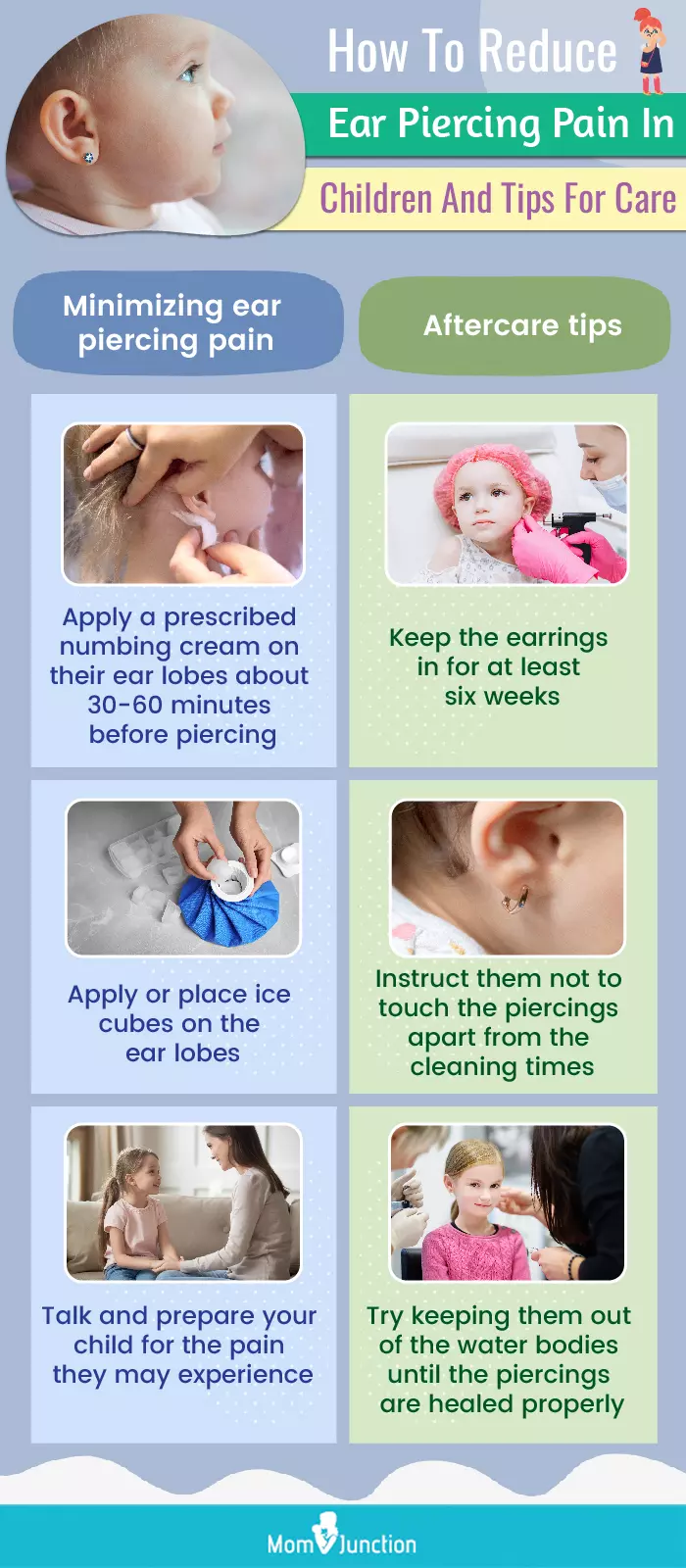
Illustration: Momjunction Design Team
Illustration: Ear Piercing For Kids: Right Age And Safety Tips
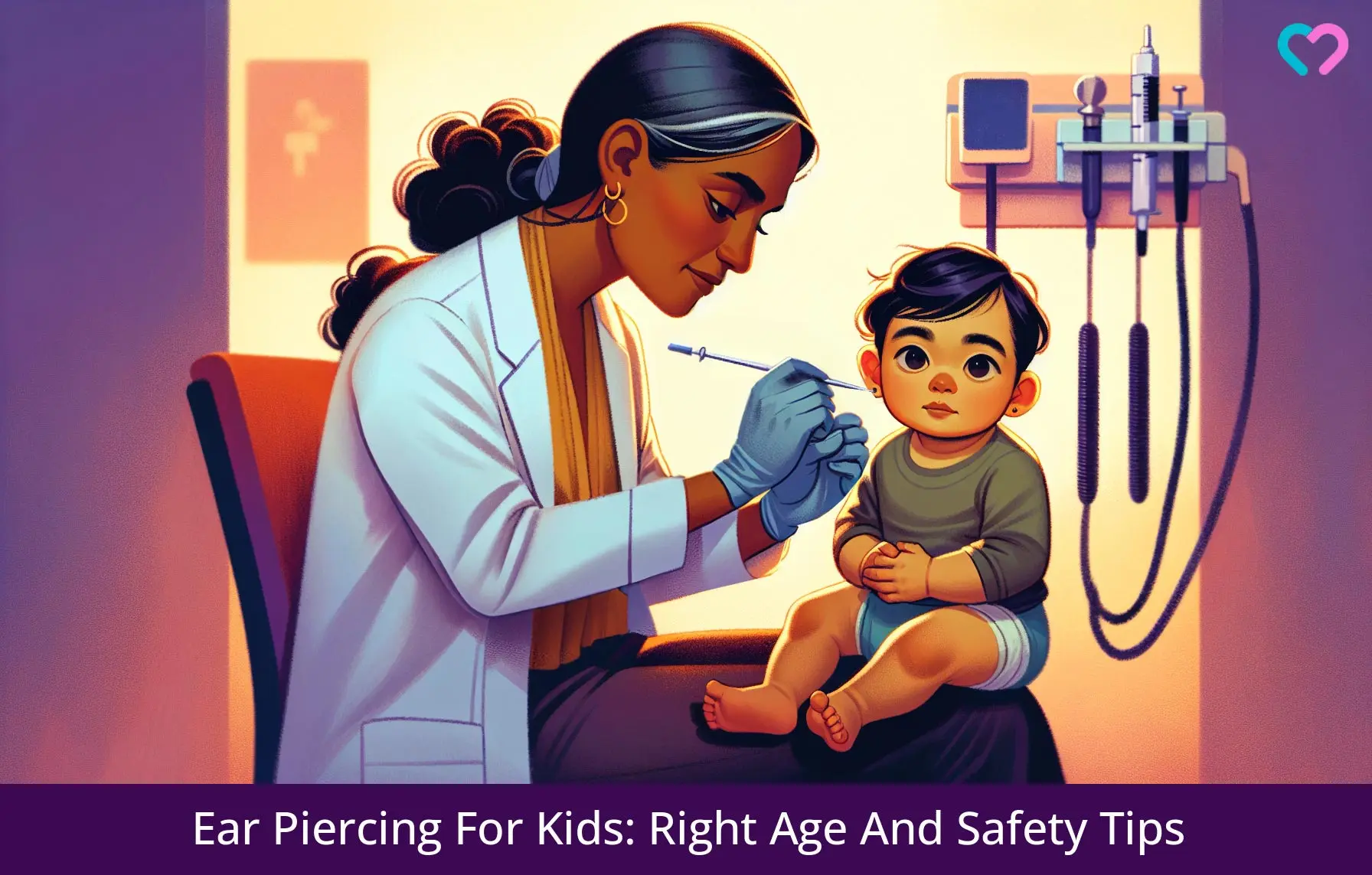
Image: Stable Diffusion/MomJunction Design Team
Discover the step-by-step process of getting ear piercings at a doctor’s office, ensuring a safe and hygienic procedure for beautiful and stylish results. Watch the fascinating process unfold in this informative video.
Personal Experience: Sources
MomJunction articles include first-hand experiences to provide you with better insights through real-life narratives. Here are the sources of personal accounts referenced in this article.
i. Ear pierced at three years old;https://mmlittlee.blogspot.com/2017/05/ear-pierced-at-three-years-old.html
ii. Getting Ears Pierced For The First Time | Daughter Didn’t Even Flinch Getting Her Ears Pierced;
https://www.youtube.com/watch?v=pyiVwJOV0-Q
References
- How to Safely Get Your Child’s Ears Pierced
https://www.hopkinsmedicine.org/health/wellness-and-prevention/how-to-safely-get-your-childs-ears-pierced - Piercer Qualifications.
https://safepiercing.org/picking-your-piercer/ - Piercing Guns.
https://safepiercing.org/piercing-guns/ - M P van Wijk et al., (2008); Ear piercing techniques and their effect on cartilage, a histologic study.
https://pubmed.ncbi.nlm.nih.gov/17684004/ - What to expect when getting your ears pierced.
https://health.clevelandclinic.org/what-to-expect-when-getting-your-ears-pierced - Ear Piercing For Kids: Safety Tips From a Pediatrician.
https://www.rileychildrens.org/connections/ear-piercing-for-kids-safety-tips-from-a-pediatrician - Infected Ear Piercing.
https://my.clevelandclinic.org/health/diseases/21503-infected-ear-piercing - Can I go swimming after a piercing?
https://www.nhs.uk/common-health-questions/lifestyle/can-i-go-swimming-after-a-piercing/
Community Experiences
Join the conversation and become a part of our nurturing community! Share your stories, experiences, and insights to connect with fellow parents.
Read full bio of Dr. Dur Afshar Agha
- Lauren Thayer is a registered nurse with over nine years of experience in various fields including pediatrics, rehabilitation, and informatics. She graduated from Graceland University and works at Children's Mercy Hospital, Kansas.
 Lauren Thayer is a registered nurse with over nine years of experience in various fields including pediatrics, rehabilitation, and informatics. She graduated from Graceland University and works at Children's Mercy Hospital, Kansas.
Lauren Thayer is a registered nurse with over nine years of experience in various fields including pediatrics, rehabilitation, and informatics. She graduated from Graceland University and works at Children's Mercy Hospital, Kansas.
Read full bio of Debolina Raja
Read full bio of Swati Patwal
Read full bio of Ghazia Shah










